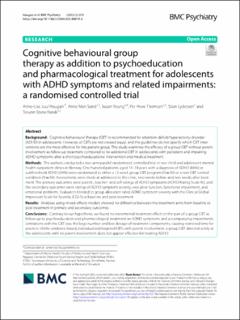| dc.contributor.author | Haugan, Anne-Lise Juul | |
| dc.contributor.author | Sund, Anne Mari | |
| dc.contributor.author | Young, Susan | |
| dc.contributor.author | Thomsen, Per Hove | |
| dc.contributor.author | Lydersen, Stian | |
| dc.contributor.author | Nøvik, Torunn Stene | |
| dc.date.accessioned | 2023-01-25T11:16:45Z | |
| dc.date.available | 2023-01-25T11:16:45Z | |
| dc.date.created | 2022-06-28T15:45:08Z | |
| dc.date.issued | 2022 | |
| dc.identifier.issn | 1471-244X | |
| dc.identifier.uri | https://hdl.handle.net/11250/3046231 | |
| dc.description.abstract | Background
Cognitive behavioural therapy (CBT) is recommended for attention-deficit/hyperactivity-disorder (ADHD) in adolescents. However, all CBTs are not created equal, and the guidelines do not specify which CBT interventions are the most effective for this patient group. This study examines the efficacy of a group CBT without parent involvement as follow-up treatment compared to no additional CBT in adolescents with persistent and impairing ADHD symptoms after a short psychoeducational intervention and medical treatment.
Methods
The authors conducted a two-arm parallel randomized controlled trial in two child and adolescent mental health outpatient clinics in Norway. One hundred patients aged 14–18 years with a diagnosis of ADHD (66%) or subthreshold ADHD (34%) were randomized to either a 12-week group CBT program (N = 50) or a non-CBT control condition (N = 50). Assessments were made at admission to the clinic, two weeks before and two weeks after treatment. The primary outcomes were parent-, teacher- and self-ratings of ADHD symptoms (ADHD Rating Scale-IV), and the secondary outcomes were ratings of ADHD symptom severity, executive function, functional impairment, and emotional problems. Evaluators blinded to group allocation rated ADHD symptom severity with the Clinical Global Impression Scale for Severity (CGI-S) at baseline and post-treatment.
Results
Analyses using mixed-effects models showed no difference between the treatment arms from baseline to post treatment in primary and secondary outcomes.
Conclusions
Contrary to our hypothesis, we found no incremental treatment effect on the part of a group CBT as follow-up to psychoeducation and pharmacological treatment on ADHD symptoms and accompanying impairments. Limitations with the CBT was the large number and low dosage of treatment components, causing restricted time for practice. Unlike evidence-based, individualized targeted CBTs with parent involvement, a group CBT directed solely at the adolescents with no parent involvement does not appear effective for treating ADHD. | en_US |
| dc.language.iso | eng | en_US |
| dc.publisher | BioMed Central | en_US |
| dc.rights | Navngivelse 4.0 Internasjonal | * |
| dc.rights.uri | http://creativecommons.org/licenses/by/4.0/deed.no | * |
| dc.title | Cognitive behavioural group therapy as addition to psychoeducation and pharmacological treatment for adolescents with ADHD symptoms and related impairments: a randomised controlled trial | en_US |
| dc.title.alternative | Cognitive behavioural group therapy as addition to psychoeducation and pharmacological treatment for adolescents with ADHD symptoms and related impairments: a randomised controlled trial | en_US |
| dc.type | Peer reviewed | en_US |
| dc.type | Journal article | en_US |
| dc.description.version | publishedVersion | en_US |
| dc.source.volume | 22 | en_US |
| dc.source.journal | BMC Psychiatry | en_US |
| dc.source.issue | 1 | en_US |
| dc.identifier.doi | 10.1186/s12888-022-04019-6 | |
| dc.identifier.cristin | 2035870 | |
| dc.source.articlenumber | 375 | en_US |
| cristin.ispublished | true | |
| cristin.fulltext | original | |
| cristin.qualitycode | 2 | |

